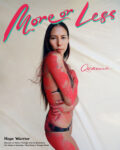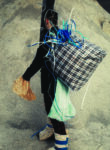Plastic. Using it is unavoidable in our everyday lives. But the reality is: it’s not good. You hopefully know by now, that every piece of plastic ever used, since the start of plastic, still exists somewhere on earth. The UK alone throws away an estimated 300 billion pieces of plastic every year. This is either plastic that is single use, and can not be recycled (for example, the granola bag, the oat milk box, the disposable coffee cup, the electric toothbrush, the toothpaste tube, and the keys on the my laptop keyboard), or discarded simply because someone can not be bothered to recycle it. A statistic that may shock – only 10% on average of the plastic you use in a year will be recycled. And only 4% of that will be recycled at a UK facility, with the rest exported to countries such as India. The remaining plastic will be sent to landfill or burned. And although burning plastic is, considered by some “an energy source,” it not only pumps poisonous fumes into the air, causing damaging health effects to people, but also releases greenhouse gasses into the atmosphere. Micro plastic particles are found in fish, whales and sea birds, and now it’s made its way into the human bloodstream.
In 2011, a small campaign started in a local Western Australian Government to encourage people to stop using plastic during July. Now an international not-for-profit, the Plastic Free Foundation believes that small changes add up to a big difference, and while it’s hard to disagree with this statement, you’d be surprised how many people think that their individual actions have no impact.
Plastic Free July is gathering momentum in the UK, as it rightfully should. Yesterday the British government invited the sports sector to ‘kick plastic out of sport’, noting that it is a huge platform to showcase sustainability and make it the new norm for people watching and taking part in sport. Encouraging deposit return schemes, rewearing old kit and avoiding those throw-away pint glasses while you watch the game are all just small things sports fan can do both at home and at sports fixtures. The beauty industry, which has long been chastised for its difficult to recycle products, has picked up its game too. Companies like Handle will send you a bag, for free, which, once filled with your empties, can be taken to any spaceNK (there are other venues also), to be recycled into brushes and mirrors. Shampoo bars and refillable products are becoming the norm too, and beauty behemoths such as L’Oréal have targeted to have 100% of their plastic packaging will be reusable, recyclable, refillable or compostable by 2025.
"The UK alone throws away an estimated 300 billion pieces of plastic every year."
Anyway. Here are some small changes we can all make for Plastic Free July. But actually they’d work just as well for every month.
– Bring one or two of those ancient old totes with you to the supermarket. You definitely have about 30 of them lurking in the back of a cupboard. Now is their time to shine.
– Buy loose fruit and veg. Although going to a greengrocer or farmers market isn’t always practical for everyone, supermarket fruit and veg is one of the worst culprits for unnecessary plastic use. (Also, ew what are you doing buying strawberries in December)
– BYOB. This one from Hydro Flask will keep your water (or wine) cold all day and is available in a number of sizes.
– BYOC. Takeaway coffee cups are lined with plastic. This renders them un-recyclable. With most coffee places offering money off if you bring your own cup, it works out in the long run, as not only cost efficient but better for ole Mama Earth too. I have an array of KeepCups in different sizes depending on how caffeinated I’d like to be and sometimes use them for a mug of cereal in the car (don’t judge). But this one from MIIR is super stylish and won’t leak too.
– Bulk Buy from Zero Waste stores. Many towns have zero-waste stores now. Not only are these generally cheaper for dry goods, but you can fill a recycled paper bag (or bring your own jar) with nuts, seeds or chocolate covered almonds and be safe in the knowledge that no plastic has been used.
– Don’t use straws. They are the worst!
– Bulk buy loo-roll. There are a few companies that will send you 48 rolls, wrapped in paper, on subscription. How often you receive them, is entirely up to you.

